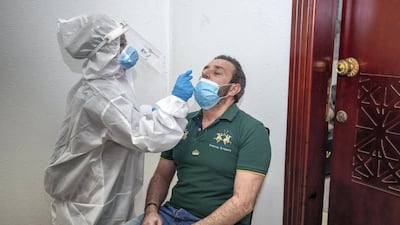The UAE has recorded more than 1,000 new Covid-19 cases for the third consecutive day.
In total, 1,008 cases were detected from more than 92,000 tests, authorities announced on Friday.
It brings the seven-day rolling average of case numbers to 872, the highest since May 24, when it stood at a record 875.
Two further deaths were registered on Friday, when 882 patients made a full recovery.
Friday’s figures brought the country's tallies to 89,540 confirmed cases and 409 deaths.
The UAE has started inoculating frontline workers against the virus after extensive tests proved a vaccine being studied in the UAE is both effective and safe.
Sheikh Khalid bin Mohamed received his shot of the vaccine during a visit to Sheikh Khalifa Medical City in Abu Dhabi on Thursday.
The member of the Executive Council and chairman of Abu Dhabi Executive Office visited the hospital on the same day frontline workers were given their first doses.
The health minister, Abdulrahman Al Owais, said the inactive vaccine could be used in "cases of emergency" involving healthcare staff.
The minister became the first person to take the vaccine outside of the trial this week.
This week scientists revealed one reason why some people develop severe symptoms as a result of the virus.
Researchers said a lack of a substance called interferon that helps orchestrate the body’s defense against viruses can lead some to fall critically ill.
They say mounting evidence suggests some people’s symptoms are caused by an impaired interferon response.
Scientists made the discovery after two sets of young brothers fell seriously sick with the virus.
All four men were young, in their 20s and 30s, and needed help to breathe. One died.
Geneticists, who were called in to investigate why the brothers had been so severely affected, discovered genetic variations and gender differences could lead to a loss of immune function.
It is hoped the discovery will lead to a new approach in treating coronavirus patients using interferon-based therapies, which are currently used in conditions such as infectious hepatitis.
The study was published on Thursday in the journal Science.
“It looks like this virus has one big trick,” said Shane Crotty, a professor in the Center for Infectious Disease and Vaccine Research at the La Jolla Institute for Immunology in California.
“That big trick is to avoid the initial innate immune response for a significant period of time and, in particular, avoid an early type-1 interferon response.”
Antibodies that blocked interferon appeared in 101 of 987 patients with severe disease, but none of 663 people with asymptomatic or mild cases, according to the study in Science.
Patients over the age of 65 were also more likely than younger ones to have the autoimmune abnormality, which was “clinically silent until the patients were infected with Sars-CoV-2,” according to the group of more than 100 scientists.
“These findings provide a first explanation for the excess of men among patients with life-threatening Covid-19 and the increase in risk with age,” the researchers led by Jean-Laurent Casanova, head of Rockefeller University’s St. Giles Laboratory of Human Genetics of Infectious Diseases in New York said.
“They also provide a means of identifying individuals at risk of developing life-threatening Covid-19.”













